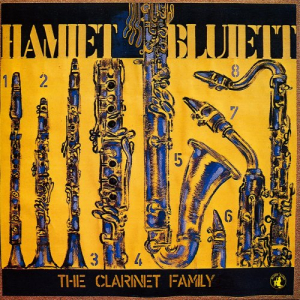Hamiet Bluiett - The Clarinet Family (Live) '1987

| Artist | Hamiet Bluiett Related artists |
| Album name | The Clarinet Family (Live) |
| Country | |
| Date | 1987 |
| Genre | Jazz |
| Play time | 1:03:16 |
| Format / Bitrate | Stereo 1420 Kbps
/ 44.1 kHz MP3 320 Kbps |
| Media | CD |
| Size | 356 MB |
| Price | Download $2.95 |
Order this album and it will be available for purchase and further download within 12 hours
Pre-order album Tracks list
Tracks list
Tracklist: 1. Sub-Jump (09:44) 2. For Macho - Dedicated To Machito (09:53) 3. Nioka (03:07) 4. Paper Works (07:49) 5. Run Away (05:22) 6. To Be There - In Memory Of Duke Ellington (15:48) 7. Solo Bass Improvisation No. 1 (03:10) 8. River Niger (04:59) 9. Song For Mama (02:54) Personnel: Buddy Collette ( Flute ) Don Byron ( Bass Clarinet ) Dwight Andrews ( Clarinet Soprano ) John Purcell ( Flute, Saxophone, Clarinet ) Kidd Jordan ( E Flat Clarinet ) Ronnie Burrage ( Drums ) J. D. Parran ( Clarinet ) Eugene Ghee ( Saxophone, Clarinet ) Hamiet Bluiett ( Sax, Clarinet ) Fred Hopkins ( Bass )  moreBluiett was first taught music as a child by his aunt, a choral director. He began playing clarinet at the age of nine. He took up the flute and bari sax while attending Southern Illinois University. Bluiett left college before graduating. He joined the Navy, in which he served for several years. He moved to St. Louis in the mid-'60s, where he met and played with many of the musicians who would become the musicians' collective known as the Black Artists Group -- Lester Bowie, Charles "Bobo" Shaw, Julius Hemphill, and Oliver Lake, among others. Bluiett moved to New York in 1969; there he joined Sam Rivers' large ensemble and worked freelance with a variety of musicians. In 1972, Bluiett's avant-garde garrulousness and his competency as a straight-ahead player gained him a place in one of Charles Mingus' last great bands, which also included pianist Don Pullen. Bluiett stayed with Mingus until 1975. In 1976, he recorded the material that would comprise his first two albums as a leader, Endangered Species and Birthright. In December of 1976, Bluiett played a one-shot concert in New Orleans with Murray, Lake, and Hemphill. That supposedly ad hoc group continued to perform and record as the World Saxophone Quartet, which in the '80s became arguably the most popular free jazz band ever. The WSQ's early free-blowing style eventually transformed into a sophisticated and largely composed mélange of bebop, Dixieland, funk, free, and various world musics, its characteristic style anchored and largely defined by Bluiett's enormous sound. Hemphill left the quartet in 1989 and in the following decades his place in the group was filled by a sequence of reedmen; meanwhile, Bluiett continued (along with Murray and Lake) to record and tour with the WSQ well into the 2000s. Throughout his performing and recording career, Bluiett also led his own ensembles and recorded a number of strong, progressive-mainstream albums for Black Saint/Soul Note. Starting in the mid-'90s, Bluiett began recording and leading sessions for Mapleshade Records (e.g., Young Warrior, Old Warrior, 1995; Bluiett's Barbeque Band, 1996; If Trees Could Talk, 2002), and also recorded for Justin Time, including 1998's Libation for the Baritone Saxophone Nation (recorded by the Bluiett Baritone Nation) and Same Space; 2000's With Eyes Wide Open; 2001's The Calling (with D.D. Jackson and Kahil El'Zabar); and 2002's Blueblack (like Libation, another four-bari outing). Bluiett grew up in Brooklyn, Illinois, and returned to live there in 2002. He continued to play bari sax until health issues made it necessary for him to stop in 2016, at which time the other members of the World Saxophone Quartet decided to end the group. Hamiet Bluiett died at his home in October 2018 at the age of 78. © Chris Kelsey Hamiet Bluiett - The Clarinet Family.rar - 356.4 MB
Related artists
Hamiet Bluiett
Album
- 2001 Blueblack
- 2000 With Eyes Wide Open
- 1999 If Trees Could Talk
- 1998 Saying Something For All
- 1998 Same Space
- 1996 Im/possible To Keep
- 1996 Walkin' & Talkin'
- 1996 Bluiett's Barbeque Band
- 1996 Bluietts Barbeque Band
- 1994 Bearer Of The Holy Flame
- 1993 Sankofa / Rear Garde
- 1991 ...you Don't Need To Know...if You Have To Ask..
- 1989 Nali Kola
- 1987 The Clarinet Family [2]
- 1984 Ebu
- 1981 Dangerously Suite
- 1977 Birthright - A Solo Blues Concert
- 1977 Resolution
- 1976 Endangered Species (rec. In Concert At The Ladies' Fort, Ny City)
Live album
